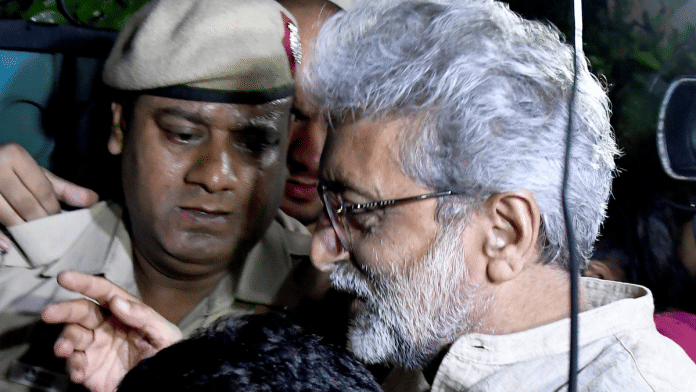New Delhi: While granting bail to human rights activist Gautam Navlakha in the Bhima Koregaon case of 2018, the Supreme Court Tuesday said that the trial could take years to conclude and that the suspect had already spent four years in jail.
In its order, a bench of justices M.M. Sundresh and S.V.N. Bhatti said that several of the other suspects had already been granted bail and that charges had yet to be framed. Under the circumstances, it wasn’t inclined to continue with the stay imposed by the Bombay High Court on its own December order granting bail to the activist, the bench said.
With this order, Navlakha, who had been under house arrest, becomes the seventh of the 16 suspects arrested in the case to be granted bail.
Here’s a rundown of what has happened in the Bhima Koregaon case so far and the fate of the other suspects in the absence of a trial.
Also Read: 4 yrs after Delhi riots, why ‘larger conspiracy’ case against Umar Khalid & others is still in limbo
The Bhima Koregaon case and the first set of arrests
The current case being pursued by the National Investigation Agency (NIA) stems from two FIRs that the Maharashtra Police filed on the violence at Bhima Koregaon on 1 January, 2018.
Investigators claim “provocative speeches” made at a preceding event in Pune’s Shaniwar Wada — whose organisers they linked to the outlawed Communist Party of India (Maoist) — led to the violence.
Maharashtra Police conducted searches at the houses of eight people — activists Surendra Gadling, Rona Wilson, Sudhir Dhawale, Harshali Potdar, Sagar Gorkhe, Deepak Dhengale, Ramesh Gaichor, and Jyoti Jagtap — with investigators saying that they recovered “incriminating materials”.
On 6 June 2018, Maharashtra Police arrested Gadling, Wilson, journalist-activist Dhawale, and two others, Shoma Sen and Mahesh Raut, and added sections of the stringent Unlawful Activities (Prevention) Act to the original case.
Cultural activists and artists Gaichor, Jagtap, and Gorkhe were also eventually arrested.
Second round of arrests
According to court documents, “materials” recovered from Sen and Raut’s houses led investigators to other activists such as Varavara Rao, Vernon Gonsalves, Arun Ferreira, Sudha Bharadwaj, Anand Teltumbde, Navlakha, and Stan Swamy.
The Maharashtra Police added their names to the original case on 23 August 2018, and eventually arrested Bhardwaj, Gonsalves, Rao, Navlakha, and Ferreira in coordinated raids across the country.
In January 2020, the Ministry of Home Affairs confirmed that it had transferred the case to the NIA, which arrested Teltumbde, a Dalit activist married to B.R. Ambedkar’s granddaughter Rama, Delhi University associate professor Hany Babu and tribal activist and Jesuit priest Stan Swamy.
Swamy died in prison in July 2021. He was 84.
That same year, two reports by a US-based digital forensic analytics company, Arsenal Consulting, said that the computers of Wilson and Gadling — evidence that formed the basis of the case against several suspects — were tampered with.
In November 2020, the NIA filed a chargesheet that was over 10,000 pages long. It was based on the Maharashtra Police’s chargesheets submitted in November 2018 and February 2019.
In December 2021, the Bombay High Court granted bail to Bharadwaj. Gonsalves, Ferreira, poet-activist Varavara Rao, Teltumbde, and Shoma Sen all got bail over the next two years, all on the orders of the Supreme Court.
Last September, the Bombay High Court granted bail to Raut but the top court stayed the order. He is yet to be released.
Meanwhile, other suspects such as Wilson, Gadling, Dhawale, Babu, Jagtap, Gaichor, and Gorkhe remain in prison.
The bail applications of Wilson, Gadling, and Dhawale are currently pending before the Bombay High Court. Babu and Jagtap have moved the Supreme Court with their bail pleas. These are still pending in court.
(Edited by Uttara Ramaswamy)
Also Read: 4 yrs since Delhi riots — ‘shoddy probe, erroneous charge sheets’, 183 acquittals & 75 discharges






